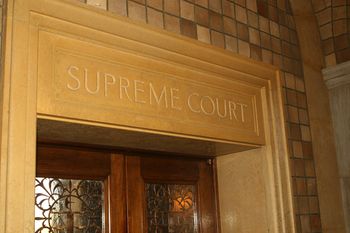Appeals
Although the American court system is designed to prevent injustice, the system is far from perfect. Mistakes made during criminal prosecutions can result in wrongful convictions and/or deprive a person of their constitutional right to a fair trial. These mistakes occur as the result of errors made by law enforcement, prosecutors, judges, jurors, and a defendant's own attorney. Fortunately, the American court system has a procedure in place that allows for a second opinion: appeals.

Although the American court system is designed to prevent injustice, the system is far from perfect. Mistakes made during criminal prosecutions can result in wrongful convictions and/or deprive a person of their constitutional right to a fair trial. These mistakes occur as the result of errors made by law enforcement, prosecutors, judges, jurors, and a defendant's own attorney. Fortunately, the American court system has a procedure in place that allows for a second opinion: appeals.
After a criminal defendant has been convicted and sentenced, they have a right to appeal their conviction and sentence to an appellate court. The appellate court will review the proceedings from the lower court to determine if any legal errors occurred. If the appellate court finds that errors did occur in the lower court proceedings, the appellate court may grant a defendant a re-trial, re-sentencing, or possibly dismiss the charges.
In Nebraska, the appeal process begins by filing a notice of appeal within 30 days of the conviction becoming final. In most cases, the Nebraska Court of Appeals would then likely hear the initial appeal. If the Nebraska Court of Appeals does not grant relief, a person may petition the Nebraska Supreme Court for a further review. If a person is serving a prison sentence, the state of Nebraska authorizes an additional appeal process known as a post-conviction action that allows for appellate review of a conviction to determine if any constitutional violations occurred. A person wishing to pursue a post-conviction action need not file the post-conviction appeal request within 30 days of their conviction; rather, the post-conviction appeal must be filed while they are still serving their prison sentence and, in most cases, within one year after the conviction became final by the conclusion of a direct appeal or the expiration of the time for filing a direct appeal.
Common grounds for appeal and post-conviction actions include:
-
Defects in the charging documents and procedures
-
Illegal searches and seizures on the part of law enforcement
-
Improperly obtained statements in violation of Miranda rights
-
Prosecutor misconduct
-
Ineffective assistance of defense counsel
-
Incorrect or incomplete jury instructions
-
Improper guilty plea
-
Improper admission or exclusion of evidence by the trial court
-
Excessive sentences
Naylor and Rappl Law Office has been effectively representing clients on appeals and post-conviction actions in Lincoln, NE for nearly half of a century. If you believe mistakes were made which affected the outcome of your case, contact us immediately. The appeal attorneys at Naylor and Rappl Law Office have the experience and knowledge necessary to effectively handle your appeal and, in the process, ensure that your rights and interests are adequately protected.


